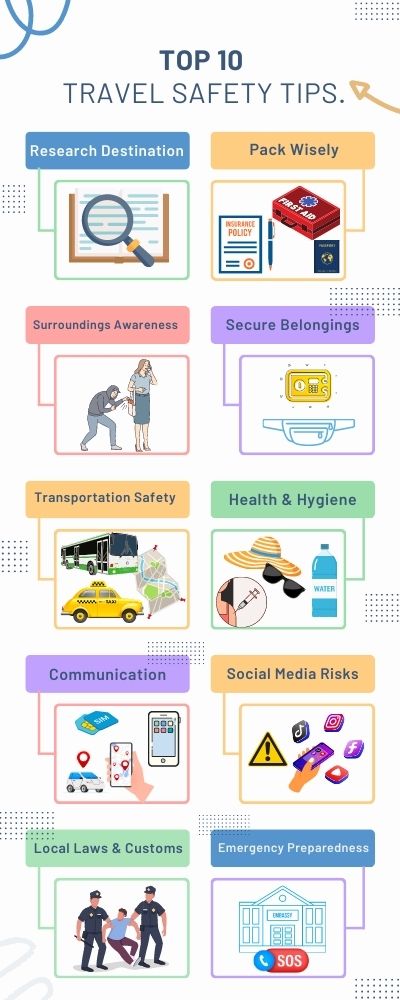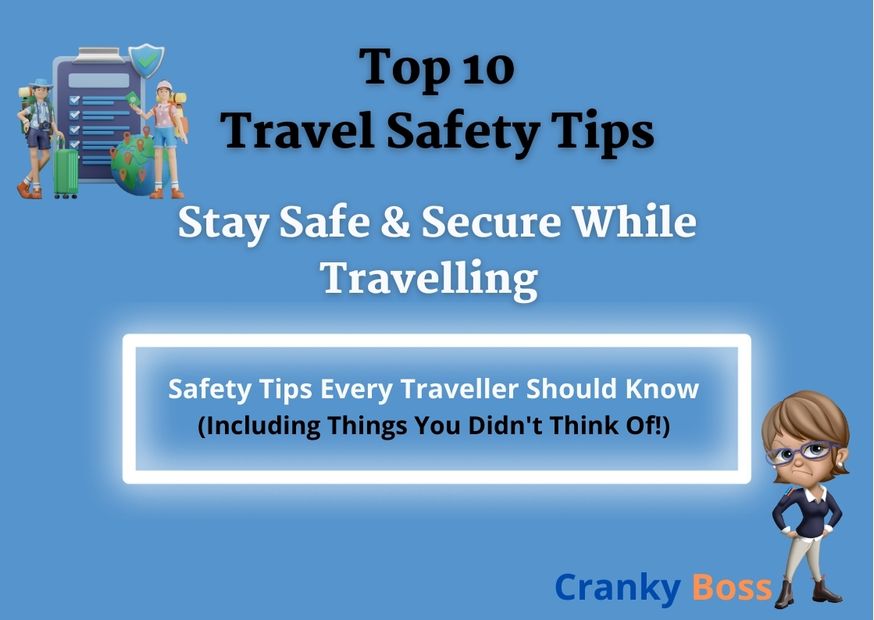Traveling the world is a thrilling and enriching experience, offering the opportunity to immerse yourself in new cultures, landscapes, and adventures. However, it’s important to remember that while exploring new destinations, safety should always be a top priority. Being well-prepared and informed can significantly enhance your travel experience and ensure you return home with unforgettable memories.

In this article, I will delve into the top 10 essential travel safety tips that will help you stay safe and secure while embarking on your global explorations.
If you are travelling for business here are some great hacks staying productive and relaxed.
1. Research Your Destination Thoroughly
Before setting foot in a new place, invest time in researching your destination. Understand the local customs, culture, laws, and potential risks. Familiarize yourself with the political climate and any travel advisories issued by your government. Reliable sources of information include official government websites, travel forums, and guidebooks. This knowledge will empower you to make informed decisions and avoid inadvertently putting yourself in risky situations. There are a few cheap countries to travel from Australia for example, but its important you have all the information in front of you so you can make an informed decision whether it is for you or not.
2. Pack Wisely
Packing plays a crucial role in your safety while traveling. If you manage to travel only with carry-on luggage, thats a massive bonus. Here are four main things you must consider. You may also visit this comprehensive travel packing list which includes things you should do before you leave.
Travel Insurance
Never leave home without comprehensive travel insurance that covers medical emergencies, trip cancellations, and lost belongings. Make sure to read the policy terms and understand what’s covered.
Many people just use the complimentary travel insurance they get from their credit card, airline, or hotel. Be careful with these, as they usually only give basic protection. If you plan to rent a motorbike or do activities like extreme sports, sailing, quad bikes, or parasailing, make sure you’re covered – sometimes these things aren’t included.

Wording matters. Ensure everything is in writing.
If you are travelling to Europe remember you can get compensated for flight cancellations and or delays.
Medications and First Aid Kit
If you have any medical conditions or require specific medications, pack an adequate supply. Additionally, carry a basic first aid kit with essentials like bandages, antiseptics, pain relievers, and any prescription medications. Carry your prescription from your Doctor at all times and ensure you are aware of any prohibited medications in the country you are visiting.
Copies of Important Documents
Make copies of your passport, visas, driver’s license, and other important documents. Store them separately from the originals and consider keeping digital copies in a secure cloud storage service.
Emergency Contacts
Have a list of emergency contacts both in your home country and the destination you’re visiting. This should include family members, friends, local contacts, and the nearest embassy or consulate.
3. Stay Aware of Your Surroundings
Vigilance is key to staying safe while traveling. Always be aware of your surroundings and trust your instincts. Some tips for staying aware include:
Situational Awareness
Pay attention to your surroundings, especially in crowded or unfamiliar areas. Avoid distractions like excessive smartphone use that might make you an easy target for theft or scams.
Stay in Well-Populated Areas
Particularly at night, stick to well-lit and busy streets. Avoid isolated areas and shortcuts that could expose you to unnecessary risks.
Beware of Scams
Scammers often target tourists. Be cautious of unsolicited offers, overly friendly strangers, and situations that seem too good to be true. Research common local scams for your destination to be better prepared.
4. Secure Your Belongings
Theft is a common concern for travellers. Safeguard your belongings to minimize the risk.
Use Antitheft Gear
Invest in antitheft backpacks, purses, and wallets that have built-in security features such as lockable zippers and slash resistant straps.
Avoid Flashy Displays
Flashy jewellery, expensive cameras, and designer clothing can attract unwanted attention. Opt for a more lowkey appearance to blend in with the locals.
Hotel Security
Use the hotel safe for your valuables and lock your room when you leave.
Do Not use your own door stoppers or other security gadgets in hotels. Instead, you should rely on the locks provided by the hotel. Here’s why:
- Damage to Property: Using unauthorized door stoppers or security gadgets can potentially damage the hotel room’s door, frame, or furniture. You may be held responsible for repair or replacement costs.
- False Alarms: Unconventional security measures may lead to false alarms. If you accidentally trigger a loud alarm, it could disturb other guests and create unnecessary panic.
- Violation of Hotel Policies: Hotels often have strict policies against tampering with or modifying their room fixtures. Using unauthorized security gadgets might be in violation of these policies, potentially leading to consequences.
- Evacuation Concerns: In the event of an emergency, such as a fire or natural disaster, unconventional security gadgets could slow down or complicate the evacuation process, potentially jeopardizing your safety.
- Bypassing Security Features: Modern hotel doors are equipped with electronic locks and other security features. Using door stoppers could potentially interfere with these systems or allow them to be bypassed, compromising your safety.
- Unauthorized Entry: Using door stoppers may make it easier for unauthorized individuals to gain access to your room, as it can prevent the door from fully closing or locking properly.
5. Transportation Safety
Getting around in a new destination requires careful planning.
Public Transportation
Research the local public transportation system before using it. Be cautious of overcrowded buses and trains and keep an eye on your belongings.
Licensed Transportation
If you’re using taxis or rideshare services, ensure they are licensed and legitimate. Share your ride details with someone you trust and avoid sharing personal information with drivers.
Driving Safety
If you plan to rent a car, familiarize yourself with local traffic laws and road conditions. Carry a physical map in case GPS fails and keep emergency contact numbers handy.
6. Health and Hygiene
Staying healthy is crucial during your travels. Ensure you know who to contact in a medical emergency or situation. I recently travelled with friends to the Dusit Thani Pool Villas in Phuket and was able to navigate a medical emergency for a friend in a matter of minutes. I had noted phone numbers and who to call at 2:00 am. It’s critical to have this information readily available.
Drink Safe Water
In many destinations, tap water may not be safe to drink. Stick to bottled water and avoid ice in drinks.
Food Safety
Be cautious with street food and uncooked produce – opt for reputable eateries and wash your hands frequently.
Sun Protection
Protect your skin from sunburn by using sunscreen, wearing protective clothing, and seeking shade during peak sun hours.
Vaccination Readiness
Before your journey, check if the destination country requires specific vaccinations or health precautions. Certain countries may have mandatory vaccination requirements to prevent the spread of diseases. Research and consult with a healthcare professional to ensure you’re up-to-date on necessary vaccinations, like yellow fever or typhoid, to protect your health and comply with entry regulations. Vaccinations not only safeguard your well-being but also contribute to the overall safety of your travels.
7. Communication & Virtual Safety
Maintaining communication channels can be a lifeline during emergencies.
Local SIM Card
Consider getting a local SIM card for your phone to have access to local networks and data.
Download Offline Maps
Before you arrive, download offline maps of the area you’ll be exploring. This can be invaluable if you get lost without an internet connection.
Check-in Regularly
Let someone back home know your daily plans and check in with them regularly. This is especially important if you are a solo traveller as it can reduce anxiety significantly.
Tracking Apps
Consider using location-sharing apps with trusted contacts. Download apps like WhatsApp that allows them to see your real-time location, providing an extra layer of security and peace of mind. If you are travelling with kids using GPS apps to keep track of their location especially in crowded places such as markets can provide peace of mind.
8. Avoid oversharing on social media
While social media can be a valuable tool for sharing travel experiences and staying connected, it also carries inherent risks when not used wisely. Over-sharing your real-time location and activities on public platforms can potentially alert wrongdoers to your absence from home, making your property vulnerable to theft. Moreover, revealing sensitive travel details might expose you to scams, unwanted attention, or even compromise your physical safety.
It’s essential to strike a balance between sharing your adventures and safeguarding your personal information to ensure a secure and worry-free journey. Never share your boarding pass on social media and other personal and private details.
9. Respect Local Laws and Customs
Respecting local laws, customs, and cultural norms is not only courteous but can also keep you out of legal trouble.
Dress Appropriately
Research the dress code for the destination, especially if you’re visiting conservative or religious areas.
Photography Rules
Always ask for permission before taking photos of people, religious sites, or government buildings.
Drug Laws
Be aware of the local drug laws; penalties for drug related offenses can be severe in some countries.
10. Emergency Preparedness
While we hope for the best, it’s wise to be prepared for the worst.
Know Emergency Numbers
Familiarize yourself with the local emergency numbers for police, ambulance, and fire services.
Locate Nearest Embassy/Consulate
Find out the location and contact details of your country’s embassy or consulate in case you need assistance.
Stay Informed
Monitor local news and follow any safety advisories issued by local authorities.
Conclusion
Exploring the world is a remarkable experience, offering endless opportunities for adventure and personal growth.
By prioritizing safety and taking proactive measures, you can ensure that your travel experiences are not only enriching but also safe and secure.
Research, preparation, awareness, and respect for local customs are your allies in staying safe while embarking on your global journey.
If you need assistance in selecting which airlines to travel with you can head on over and read more about the best airlines to fly.
Remember, a well-prepared traveller is a confident traveller who can fully immerse themselves in the wonders of the world while keeping their safety paramount.


